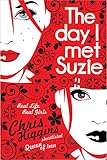
Price: £6.99
Publisher: Hodder Children's Books
Genre: Fiction
Age Range: 14+ Secondary/Adult
Length: 368pp
Buy the Book
The Day I Met Suzie
It’s been ‘a summer of love’ for F.E. College students Indie and Rick. She’s learning the trade at the Herr Cutz salon and he’s fixing cars at the garage – both are enjoying the work. In the evenings, time drifts happily by with young love-making, either out in Rick’s latest old banger, or among the sand-dunes, dreaming dreams of life together.
First day back at College and things start to go wrong. Rick’s nicked for speeding but far worse (as it turns out), Indie meets Suzie, an insignificant, needy girl who says she’s had a rough deal from Life, especially at the hands of a recent boy friend. Indie has always had a warm heart for a lame duck, and hardly notices how Suzie insinuates herself into Indie’s life, alienating her from her college friends, distancing her from Rick. Suzie even manipulates her way into moving in with Indie’s family, and then transforms her own appearance until people take the two for sisters. Suzie – or Scarlett as she calls her reinvented self – embroils Indie and Rick in a scam which sucks them into debt upon debt and the hands of a threatening loan shark, and consequently into crime and the threat of a jail sentence.
The novel initially plunges its reader into the middle of this mess with a desperate Indie on the ‘phone to the Samaritans. Gently, her listener persuades Indie to tell her (and us) the whole story. Eventually the narrative catches up with that conversation and the Samaritan is able to provide some factual information which begins to turn things around. Scarlett and her accomplice (the loan shark) are defeated, though there is a price to be paid. To avoid involving the police, since Indie and Rick have broken the law, they have to lie and scheme themselves. Indie’s a sadder and a wiser woman by the time she gets her second chance.
As so often with Teenlit, a reader needs to accept, or ignore, some implausible narrative devices. The Indie who talks wildly, even abusively, with the Samaritan listener, speaks in language we can believe; but the sustained story she tells between the snatches of telephone conversations is written in the accomplished prose of fictional narrative, not through a broken, anxious teenage voice. Nevertheless, Chris Higgins is an experienced writer in the genre, twice nominated for the Queen of Teen Award, and her readers probably will not be deflected by such a quibble as they coast swiftly through this tale of F.E. angst with its edge of danger and violence.



